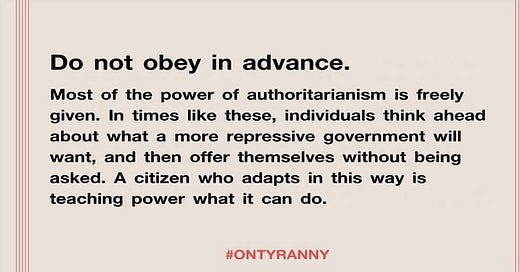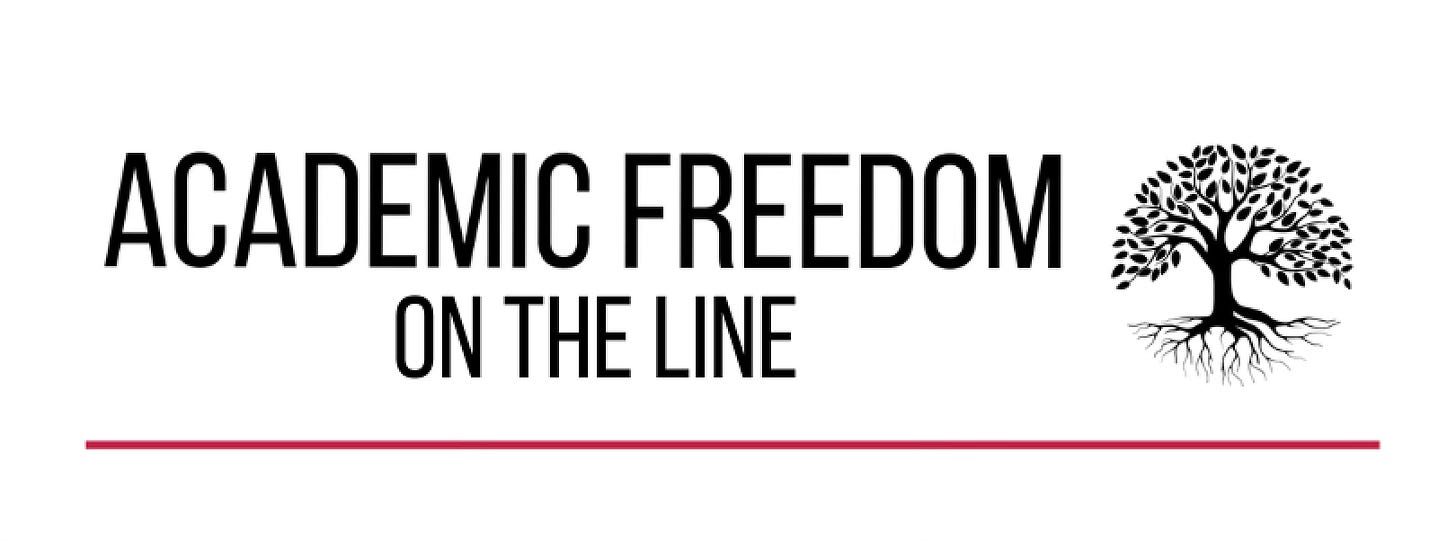News Round-Up: Obeying in Advance Edition
Higher Ed institutions aren't going to survive by ducking and covering.
In the past several months, perhaps even over the last several years, lots of folks have become familiar with Timothy Snyder’s On Tyranny: Twenty Lessons from the 20th Century.
In the midst of what can only be described as an all-out assault on democratic institutions, On Tyranny has taken on something of a self-help book, an instruction manual for resisting these attempts to destroy the commons. As articulated in the Center for the Defense of Academic Freedom Mission Statement, we believe that higher education institutions have an important role in creating the conditions that allow for a free people and so resisting attacks on the institutions and the principles they’re meant to uphold is necessary.
In fact, the second of Snyder’s twenty lessons is “Defend Institutions” because authoritarians know that institutions are mechanisms for the exercise of democratic will. This is obviously true when it comes to higher education institutions.
One of the keys to the defense of institutions can be found in Snyder’s first lesson:
Unfortunately, there are already numerous examples of institutions reacting to edicts and executive orders from the Trump administration (some of which have no force of law, and others of which may not even be lawful) by preemptively cancelling or restricting activities. This is a mistake. Attempting to make yourself a smaller target for those who wish to do you harm will not stop those forces from attacking.
The AAUP has issued a statement “Against Anticipatory Obedience” covering the history and background of similar attacks on higher education, and giving specific suggestions for how to urge institutions engaged in anticipatory obedience to stand by their principles and important work they’re meant to embody.
These are some examples we’ve seen of what looks to be institutions obeying in advance, harming their stakeholders, and undermining their own missions. We’ll try to keep this updated as more examples emerge. If you have examples not covered here, please share them in the comments.
And next news update, we’re hoping to share some examples of successful pushback against these attacks on academic freedom. Please share any examples of those actions you have in the comments or send them to us by replying to this newsletter as well.
“UNT faculty slam university for removing references to race and equity in course names”
November 19, 2024 via The Texas Tribune.
“Professors and instructors say the university is preemptively censoring itself after administrators removed references to race and equity in dozens of College of Education course titles and descriptions.”
“Rutgers cancels DEI conference after Trump executive orders, drawing ire of NJ politicians”
January 25, 2025 via the Daily Record.
“Rutgers University has drawn the ire of New Jersey politicians for cancelling a scheduled diversity, equity and inclusion conference after President Donald Trump's executive orders on DEI this week.”
“Northeastern purges DEI websites and messaging amid Trump executive order” January 29, 2025 via The Huntington News.
“With the removal of the original DEI website comes the loss of a large swath of information used by university affiliates from underrepresented communities.”
“MSU college abruptly cancels Lunar New Year event, citing Trump DEI orders”
January 30, 2025 via The State News.
“Michigan State University cancelled an annual Lunar New Year celebration following new executive orders targeting diversity, equity and inclusion policies and concerns from students, according to emails obtained by The State News.”
“UMN pauses DEI expansion, hiring for Law School Assistant Dean position”
February 1, 2025 via The Minnesota Daily.
“In an email announcing a pause on hiring for the Assistant Dean of Diversity, Equity and Inclusion at the Law School, Dean William McGeveran said the University is reassessing its DEI programs.”
The views expressed in this newsletter are those of individual contributors and not those of the American Association of University Professors (AAUP) or the AAUP’s Center for the Defense of Academic Freedom.







